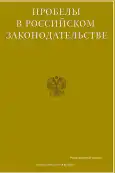Phishing as a Threat to Business and the State
- Authors: Volkova O.V.1, Drozdova E.A.2
-
Affiliations:
- Moscow International University
- Russian University of Transport (MIIT)
- Issue: Vol 16, No 2 (2023)
- Pages: 279-283
- Section: Criminal Law Sciences
- URL: https://journals.eco-vector.com/2072-3164/article/view/568893
- ID: 568893
Cite item
Abstract
In this article, emphasis is placed on the relevance of problems related to the threats of fraudulent actions affecting businesses and individual citizens. The situation related to the theft of funds through telecommunication channels is thoroughly examined. A common method of fraud that impacts both businesses and citizens is discussed. The concept of phishing is explained, and the norms associated with criminal law protection of these relations are analyzed. All types of fraud provided for by the Criminal Code of the Russian Federation are studied.
The purpose of this work is to demonstrate the threat posed by fraudulent activity using phishing for businesses and society, and to suggest ways to address these problems. As a result of the research, the authors propose amendments to the resolution of the Plenum of the Supreme Court of the Russian Federation concerning the concept of phishing and all possible methods of fraud at the current stage of development of society and the state. For law enforcement, it is recommended to qualify the actions committed under Article 159 of the Criminal Code of the Russian Federation, as this norm covers the entire spectrum of possible methods. In addition, the authors suggest decriminalizing Article 159.6 of the Criminal Code of the Russian Federation, as it does not reflect the current reality and leads to errors in its application.
Full Text
About the authors
Olesya V. Volkova
Moscow International University
Author for correspondence.
Email: volkovaolesia@mail.ru
Cand.Sci.(Law), Associate Professor
Russian Federation, MoscowElena A. Drozdova
Russian University of Transport (MIIT)
Email: Gorbunovala@ya.ru
Cand.Sci.(Law), Associate Professor, Associate Professor of the Department «Criminal law, Criminal Procedure and Law Enforcement»
Russian Federation, MoscowReferences
- The Criminal Code of the Russian Federation No. 63-FZ of 13.06.1996 (as amended on 21.11.2022). [Electronic resource] URL: https://base garant.ru/10108000 /(accessed: 19.03.2023).
- Review of transactions made without the consent of clients of financial institutions, prepared by the Central Bank of the Russian Federation in 2021. [Electronic resource] URL: https://cbr.ru/analytics/ib/operations_survey_2021 / (accessed: 15.03.2023).
- Judicial practice Appeal ruling of the Supreme Court of the Russian Federation of July 7, 2022 [Electronic resource] URL: https://sudact.ru/vsrf/doc/0GxZN4G0Ri1Q /?vsrf-txt=article +159+criminal code+rf&vsrf- case_doc=&vsrf-lawchunkinfo=&vsrf-date_from=&vsrf-date_to=&vsrf-judge=&_=166143026399&snippet_pos=1884#fragment (accessed: 20.03. 2023).
- Resolution of the Plenum of the Supreme Court of the Russian Federation dated 30.11.2017 No. 48 (ed. dated 29.06.2021) «On judicial practice in cases of fraud, embezzlement and embezzlement» // Rossiyskaya Gazeta, No. 280, 11.12.2017.
- Antonov, I. O., Shalimov A. N. Actual problems of fraud investigation using computer information. [electronic resource]. Scientific Electronic Library – Access mode: URL: http://cyberleninka.ru/article/n/aktualnye-problemy - investigations-of-fraud-using-computer-information (date: 20.03.2023).
- Alferova, Yu. O. Problems of qualification of computer fraud. – Scientific electronic library. [electronic resource]. Access mode: URL: http://cyberleninka.ru/article/n/problemy-kvalifikatsii - computer fraud (accessed: 20.03.2023).
- Boytsov A.I. Crimes against property. - St. Petersburg: Publishing house «Legal Center Press». 2010. 775 p. 21.
- Volzhenkin B.V. Fraud. - St. Petersburg: Publishing House of the St. Petersburg Law Institute of the Prosecutor General’s Office of the Russian Federation. 2018. 36 p.
- Rusanov G.A. Crimes against property. Textbook and workshop for universities: for students of higher educational institutions studying in legal fields. - Moscow :Yurayt. 2018. 173 p.
- How to recognize the schemes used by fraudsters in 2022: telephone and not only, as well as the newest [Electronic resource]. URL: https://ogon.ru/news/12156-kak-raspoznat-shemy-po-kotorym-deystvuyut-moshenniki-v-2022-godu-telefonnye-i-ne-tolko-a-takzhe-samye-novye - (date of appeal: 20.03. 2023).
- Silkin V.P. Problems of distinguishing fraud with related crimes committed through deception and abuse of trust // Problems of Economics and Legal practice, 2017. No. 6. pp. 195- 197.
- Tsepelev V.F., Tsepelev K.V., Drozdova E.A., Radchenko E.P., Borisov A.V. Violation of economic security in the financial market of Russia and criminal law // Social and cultural transformations in the context of modern globalism. The 4th International Conference on Social and Cultural Transformations in the Context of Modern Globalism (SCTCMG 2021). Volume 117. Grozny, 2021.
Supplementary files








